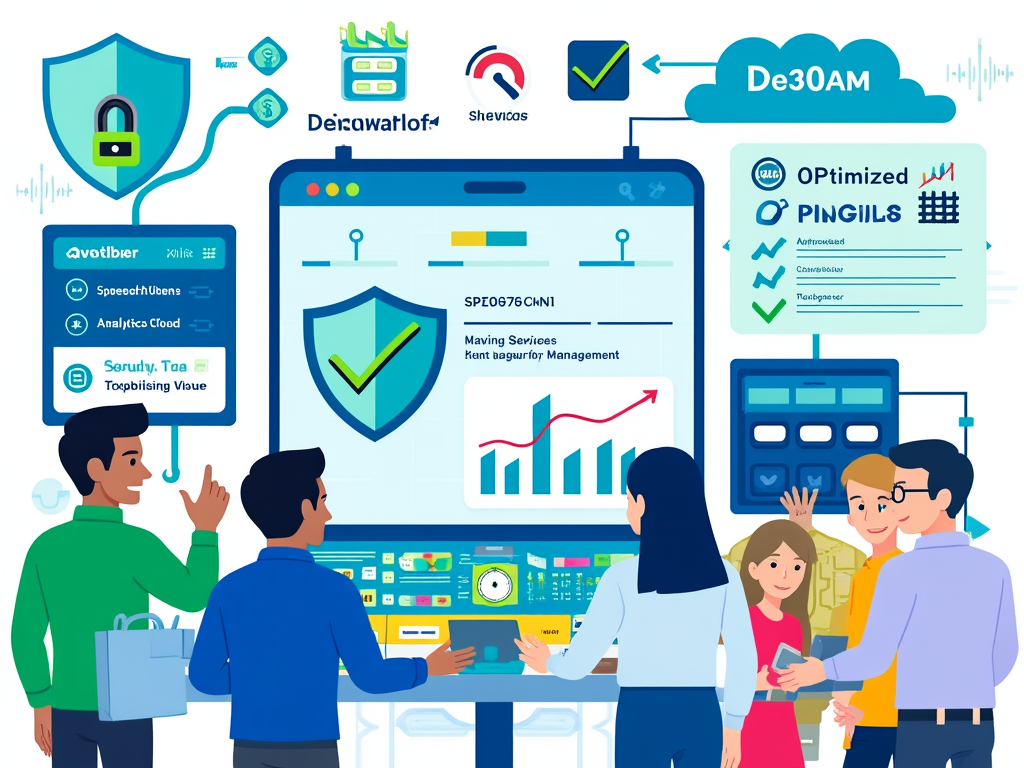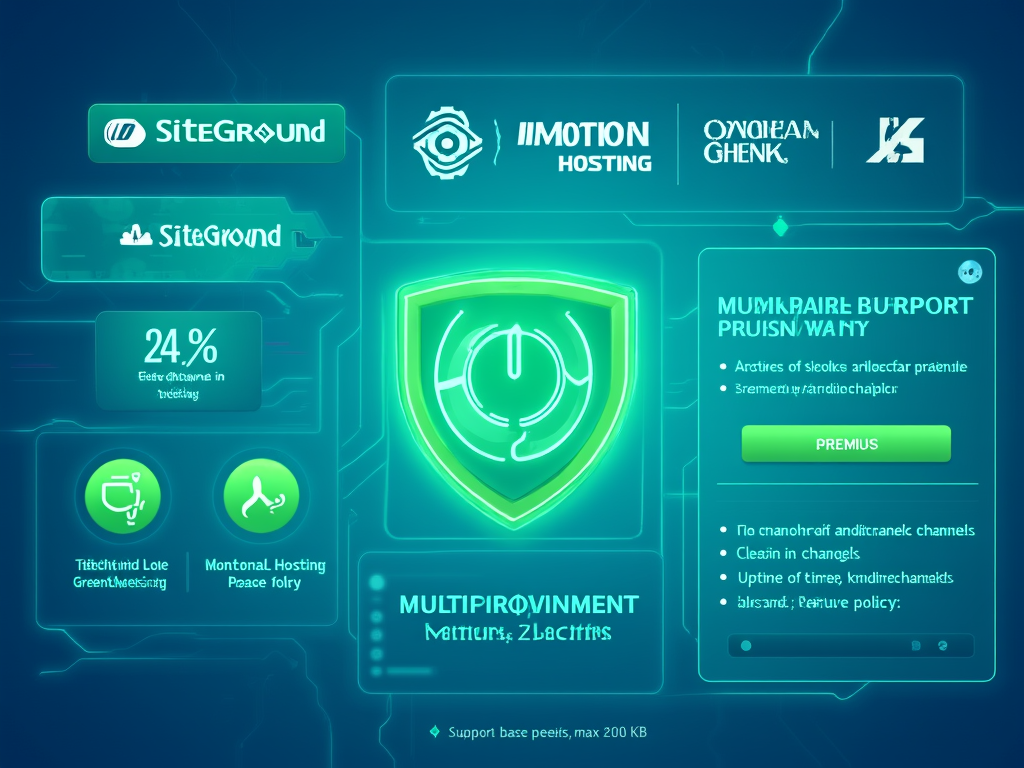Best hosting for educational websites and online courses
Introduction
In the expansive digital landscape, educational websites and online courses have emerged as beacons of knowledge and opportunity. The architecture beneath these virtual learning spaces is vital—specifically, the hosting services supporting them. Imagine a platform where students explore, learn, and grow, seamlessly connected to their resources like a flowing river. Choosing the right hosting is akin to selecting a solid foundation for a skyscraper: it can either elevate your educational mission or lead to collapse under pressure.
Essential Features of Hosting for Educational Websites
When you dive into the sea of hosting options, it's crucial to sift through them and identify what truly matters for an educational setting. Let’s break it down into digestible chunks.
Reliability and Uptime
Your site’s accessibility must be unfaltering. Picture this: a student prepared for an exam, only to find your site down. Heart-wrenching, right? A reliable host guarantees at least 99.9% uptime, ensuring students and educators can dive into learning whenever inspiration strikes.
Security
With data breaches making headlines, your responsibility to protect user information becomes a serious concern. Seek hosts with free SSL certificates (to encrypt data), DDoS protection, and top-notch malware defense. A robust security framework fortifies trust, allowing your users to feel safe as they engage and interact.
Performance and Speed
In a world of instant gratification, waiting for a website to load is akin to watching paint dry. Fast page loads can significantly enhance user experience. Look for hosting that includes SSD storage, smart caching solutions, and speed optimization tools. An efficient website keeps students engaged, nurturing their thirst for knowledge without distraction.
Scalability
Your educational platform should grow dynamically with increasing traffic and content. Envision starting with a modest offering, but then—bam!—you have an influx of eager learners. Opt for scalable hosting plans that turbo-charge resources on-the-fly, ensuring smooth transitions through various growth stages. Cloud services often provide this flexibility beautifully.
Ease of Use
Not all educators are tech wizards. Establish simplified management systems that don’t require coding prowess. Features like one-click WordPress installations and user-friendly dashboards (such as cPanel) can facilitate the website setup and management process, allowing educators to focus on what truly matters—their students.
Email and Domain Services
Professionalism matters in education. Hosting plans that offer free domains for the first year and multiple email accounts help establish a credible online presence. Just think about how easy it is to create a vibrant course community through personalized email communications.
Examples:
-
TMDHosting: Affordable at $2.99/month, with 50GB SSD, free SSL, and domain (a year) included, this host stands out. Their use of CloudLinux ensures dedicated resources, vital for schools demanding high availability.
-
GreenGeeks: Not only budget-friendly at $2.95/month, but their eco-friendly approach (operating on 300% renewable energy) adds an ethical touch that resonates with many educators. With 50GB SSD and email accounts, they cater well to class blogs and educational portfolios.
-
InMotion Hosting: Starting at just $2.24/month (with a sweet 50% discount for students and educators), with 100% uptime, excellent speed, and robust support, it’s perfect for users wanting power coupled with reliability.
Hosting Options for Online Course Platforms
Beyond standard hosting, specialized platforms can cater to your online course needs. Just like a tailor-made suit, they fit your educational programs snugly, offering features that matter.
-
Integrated Course Management Tools: Drag-and-drop editors become essential for building attractive, functional content spaces without needing design expertise.
-
Learner Experience: A smoothly functioning interface keeps students engaged. A cluttered, confusing setup? That’s a quick route to frustration.
-
Payment and eCommerce Integration: Monetizing courses? You'll need seamless payment gateways like Stripe or PayPal, which ensure transactions are as smooth as your course content.
-
Advanced Customization: Branding is key. Look for platforms that allow personalization with CSS and JavaScript editing to give your course the unique image it deserves.
-
Analytics and Reporting Tools: The power to track progress and engagement through analytics is invaluable. This data gives educators insight into adjusting their offerings dynamically.
Popular Course Hosting Platforms: Notable players include Skilljar, Thinkific, Teachable, and Mighty Networks, with varied strengths depending on ease of use, integration capabilities, and scalability resources.
Structuring Your Educational Website
Designing your educational site involves critical decisions about purpose and structure. Will it be a static informational presence, or a dynamic, interactive learning hub?
-
Defining Purpose and Structure: For static sites, simplicity suffices. For complex platforms, focus on building a responsive, database-driven model.
-
Dynamic Hosting Technologies: Harnessing a LAMP stack (Linux, Apache, MySQL, PHP) allows advanced functionality for educational sites. Such hosting is often where top-tier academic tools thrive, especially for tech-savvy educators who crave control.
Additional Considerations for Educational Hosting
Beyond the basic features, consider these critical elements that would make or break your experience:
-
Support Availability and Quality: The digital world can be unpredictable. 24/7 access to tech support via chat, email, or even phone can become a lifeline when you face critical issues.
-
Cost Efficiency: Budget constraints often challenge educational projects. Scour for affordable plans that still deliver top-tier services or offer meaningful discounts dedicated to educators.
-
Environmental Impact: Opting for eco-friendly hosts aligns seamlessly with educational objectives about sustainability. Hosting that prioritizes green practices sets a meaningful precedent for students and institutions alike.
Visual Elements Suggestion
To aid understanding, visualize your choices with a simple comparison table. Summarize key features across potential hosts and platforms, making it easier for educators to evaluate what fits their vision best.
| Feature | TMDHosting | GreenGeeks | InMotion Hosting | Education Platforms (e.g., Skilljar) |
|---|---|---|---|---|
| Price per Month | $2.99 | $2.95 | $2.24 (student deal) | Varies, usually $39+ |
| Storage | 50GB SSD | 50GB SSD | 100GB+ SSD | Course content storage included |
| Free Domain | 1 year | 1 year | Yes (some plans) | N/A |
| Uptime Guarantee | 99.9% | 99.9%+ | 100% | Varies |
| SSL Included | Free | Free | Free | Included |
| Course Tools | Yes (WordPress) | Yes (WordPress) | Yes | Built-in LMS features |
| Support | 24/7 | 24/7 | 24/7 | Customer success teams |
| Eco-friendly | No | Yes (300% renewable) | No | Depends on host |
This table stands as a quick-reference guide, empowering educators with the insights required to make informed choices.
Selecting the right hosting for educational websites and online courses is an endeavor filled with promise, paving the way for immersive learning experiences that echo across futures untold. As more educators tread this path, they harness the power of technology to spark transformation in learning, one website at a time.
FINDDOMAIN.GE (Internet services LLC) is a very interesting and rapidly developing IT company. The main directions are: web development, domain and web hosting. It also offers clients sub-services and outsourcing related to the main services.
BEST OFFERS:
Do you want to create your own company website or create your own online business on the Internet?
– WEB HOSTING
– DOMAIN REGISTRATION
– WEB DEVELOPMENT
– SITE BUILDER



## Choosing the Right Hosting Plan
As you explore the options in detail, understanding how to align hosting with your specific educational goals is vital. Each hosting plan caters to various user needs, and knowing your audience ultimately helps refine your choice.
Shared Hosting vs. VPS Hosting
The decision between shared and VPS (Virtual Private Server) depends chiefly on the volume of traffic and resource requirements.
-
Shared Hosting: This is often the first step for educational websites, suitable for small projects, blogs, or introductory courses. It’s budget-friendly and makes maintenance easy. However, be prepared for occasional slowdowns during peak traffic, as resources are shared across multiple sites.
-
VPS Hosting: Consider this when you begin scaling up. A VPS offers a dedicated portion of server resources, ensuring better performance and higher customization options. It is ideal for online institutions that anticipate growth or require special configurations.
Cloud Hosting for Flexibility
Cloud hosting has revolutionized the hosting landscape by offering unparalleled flexibility. Your resources scale seamlessly in response to traffic spikes, maintaining performance even during high-demand periods. For instance, if a course suddenly attracts thousands of new students, cloud hosting adjusts accordingly, ensuring a consistent learning experience. Providers such as DigitalOcean or Amazon Web Services (AWS) cater to this need well.
Managed Hosting Solutions
For educators lacking extensive technical knowledge, opting for managed hosting solutions can save time and trouble. With managed services, the hosting provider handles tasks like security, backups, and updates. This allows educators to focus on content creation and student engagement—where their passion lies.
The Importance of Backups
Regardless of the type of hosting, always prioritize data backup solutions. Regular backups mitigate risks related to data loss due to hacking, server failures, or accidents. Look for hosting services that offer automated backup features or integrate smoothly with third-party backup solutions like BackupBuddy or VaultPress.
Enhancing Your Educational Site
Once you’ve selected a hosting plan that aligns with your vision, the next step involves improving your site's functionality and attractiveness.
Optimizing Performance
To further enhance the website’s speed, consider leveraging Content Delivery Networks (CDNs) like Cloudflare or Fastly. A CDN distributes static content to servers closer to your users, drastically cutting load times. This becomes crucial for educational sites with multimedia content, enhancing students’ experience as they access lessons, videos, and interactive tools.
User-Friendly Design
Effective course delivery hinges on a user-friendly interface. Use platforms like WordPress with empowering plugins such as LearnDash or MemberPress to streamline course organization and ensure accessibility. Design considerations should reflect the usability—intuitive navigation, searchable content, and mobile-responsive layouts are key for accommodating diverse learning styles.
Integrating Interactive Elements
Consider utilizing tools like Zoom for live classes or Google Classroom for classroom management. Engaging students through live interactions or real-time feedback platforms can create an enriched learning environment. These elements tastefully blended with traditional content can significantly boost engagement.
SEO Strategies for Visibility
To ensure your educational platform reaches its intended audience, focus on valid SEO strategies. Optimize content with targeted keywords, meta descriptions, and alt tags for images. A solid foundation in SEO ensures that students searching for relevant courses or materials can easily discover your content.
Conclusion
In the vast realm of educational technology, the importance of selecting the right hosting cannot be overstated. The best hosting for educational websites and online courses nourishes growth, facilitates learning, and fosters community. From reliability and security to performance and support, every hosting feature plays a pivotal role in shaping the online educational experience.
By carefully considering the unique demands of your audience and leveraging advanced tools, you can construct a vibrant online learning environment. Your educational mission can thrive in a space where both educators and students feel empowered to explore, learn, and connect.
Relevant Video Content
Explore these videos for further insights on hosting and building an educational website:
References
- TMDHosting
- GreenGeeks
- InMotion Hosting
- Skilljar
- Thinkific
- Teachable
- Mighty Networks
- Cloudflare
- DigitalOcean
- Amazon Web Services
FINDDOMAIN.GE (Internet services LLC) is a very interesting and rapidly developing IT company. The main directions are: web development, domain and web hosting. It also offers clients sub-services and outsourcing related to the main services.
BEST OFFERS:
Do you want to create your own company website or create your own online business on the Internet?
– WEB HOSTING
– DOMAIN REGISTRATION
– WEB DEVELOPMENT
– SITE BUILDER








